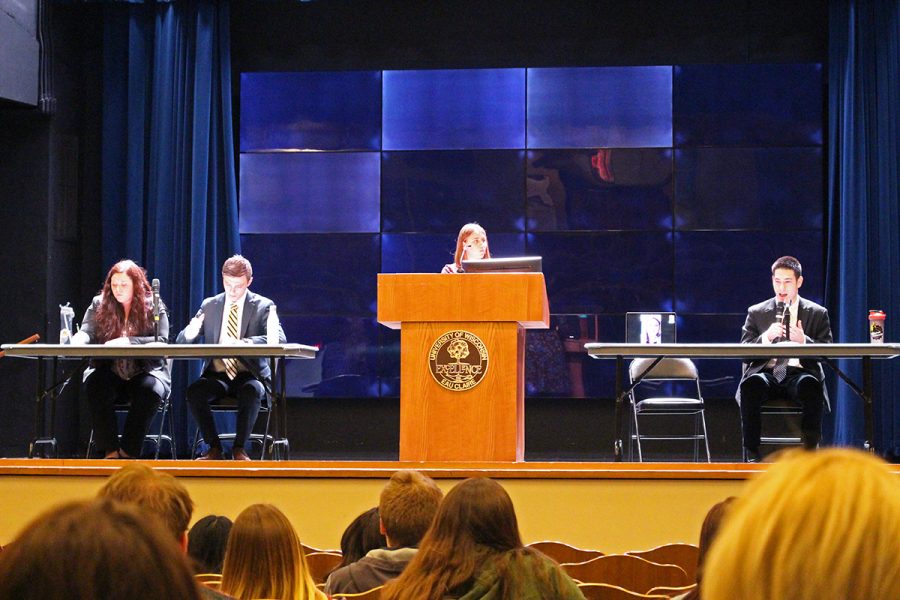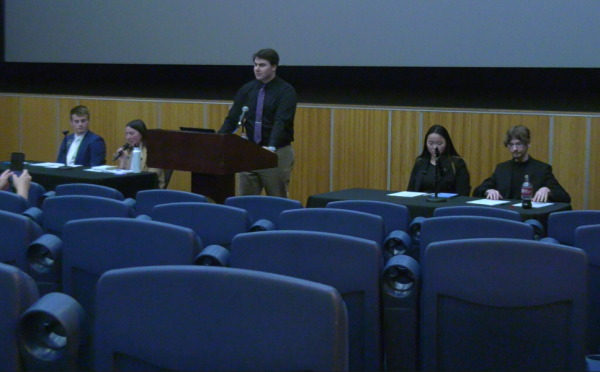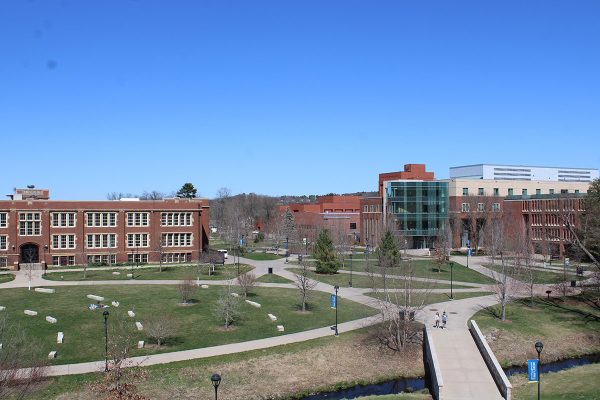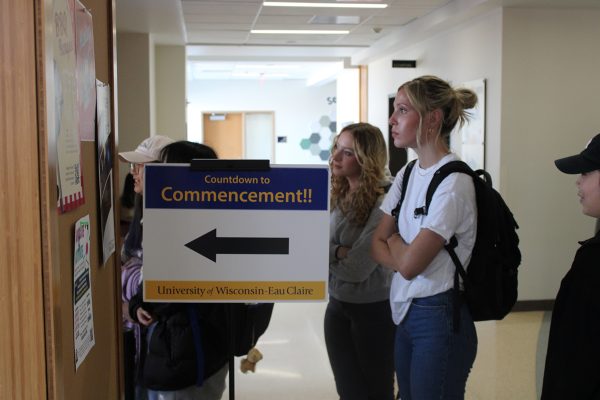Presidential debate informs voters
Voting for Senate elections to start April 16
Photo by Kar Wei Cheng
The Yates-Forrest and Nguyen-Salzman teams answered a set of questions during a president debate on Wednesday. The candidates are vying for the positions of the UW-Eau Claire student body president and vice president.
Candidates running for UW-Eau Claire’s student body president and student body vice president were given a chance to express their platforms about issues like segregated fees and student inclusivity during a presidential debate on Wednesday.
The debate — hosted by the Equity in Student Matters (ESM) Commission of Student Senate — took place in Schofield Auditorium. It preceded the Senate’s election day by five days, which will begin on April 16.
Branden Yates and Maddie Forrest, both juniors, are partenering up on one of the ballots.
“We’ve decided to run for this position because we believe not all students have a voice on campus and on Student Senate,” Yates said. “That is why we’ve decided to bridge the gap.”
On the other ballot are Robert Nguyen and Hattie Salzman, who are both second-years. Salzman was unable to attend the debate in person, so she listened in via video chat.
“We just want to let you know that we’re running for student body president and vice president because our combined lived experiences will represent the student body to the greatest extent,” Nguyen said.
Each team was given an allotted amount of time to discuss a question and then time for rebuttal.
Areas of discussion included segregated fees, campus housing and the restructuring of the UW System.
Segregated fee spending
Nguyen said he admits he does not have much experience handling segregated fees. However, he said, this will not hinder his leadership.
“I know what you can and can’t do with (segregated fees),” Nguyen said. “However, in my position, I wouldn’t try to directly work with that, I’d try to delegate tasks to people who are in, maybe, Finance Commission.”
Areas Nguyen would like to see receive more fees are inclusive community events and organizations for student with marginalized identities.
Membership on the Finance Commission and his role as chief of staff have prepared Yates for handling segregated fees, he said. During his time on the Finance Commission, he helped fund the Campus Cab and the ESM Commission.
Yates and Forrest said segregated fees give the students their voice by providing campus organizations with the funds to operate.
“It’s really, really, really vital that your student leaders can be also responsible,” Forrest said, “so that when your exec board comes to you and asks, ‘Hey, I have a question about this specific thing regarding (segregated) fees,’ we can feel confident and they can feel confident in us, knowing that we are those student leaders who have those answers for them.”
Campus housing and construction
Communication about campus construction should be improved, Forrest said. Students are unaware of reasons behind the physical changes the campus is undergoing, and she said this is problematic.
“Students want to know what’s going to be there,” Forrest said of the Garfield Avenue construction project. “There hasn’t been a whole lot of accurate and specific communication regarding it; it’s been very broad.”
Forrest said she has been in touch with the leadership at the Pablo Center at the Confluence, which will be an important shared space for students who utilize the Haas Fine Arts Building.
Student input should be at the forefront of decisions surrounding campus construction, Nguyen said. The Nguyen-Salzman team would create more opportunities for students to share their opinions by creating events modeled after the Chancellor’s Roundtable events, Nguyen said.
“Having students be able to comment on what they want will allow us to have an immediate response,” Nguyen said.
UW System restructuring
Last fall, the UW System Board of Regents passed legislation that merged two-year UW colleges with four-year universities. As a result, UW-Barron County will be a branch campus of UW-Eau Claire.
Moving forward in the multi-campus alliance, Nguyen said he and Salzman will strive for transparency. The team will reach out to Barron County’s student leaders to discover shared values.
Yates and Forrest said they will draft a memorandum to ensure each campus maintains their distinct identities. If elected, they said they plan to hit the ground running right away.
Voting for student representatives in the 62nd Session of Student Senate begins Monday, April 16 and ends Wednesday, April 18. Students will be emailed with a link to and instructions about voting at 8 a.m. on Monday.
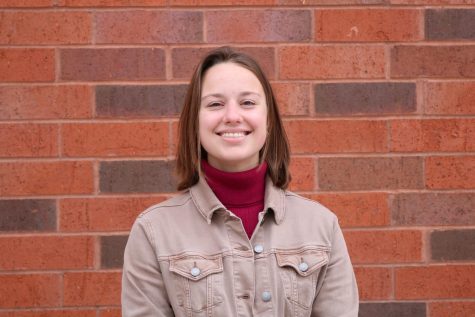
Neupert is a fourth-year journalism student at UW-Eau Claire. She is the executive producer of Engage Eau Claire on Blugold Radio Sunday. In her spare time, Neupert's working on becoming a crossword puzzle expert.

